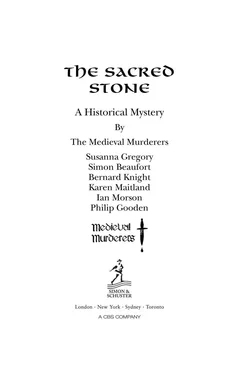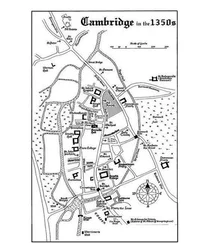Susanna Gregory - The Sacred stone
Здесь есть возможность читать онлайн «Susanna Gregory - The Sacred stone» весь текст электронной книги совершенно бесплатно (целиком полную версию без сокращений). В некоторых случаях можно слушать аудио, скачать через торрент в формате fb2 и присутствует краткое содержание. Жанр: Исторический детектив, на английском языке. Описание произведения, (предисловие) а так же отзывы посетителей доступны на портале библиотеки ЛибКат.
- Название:The Sacred stone
- Автор:
- Жанр:
- Год:неизвестен
- ISBN:нет данных
- Рейтинг книги:4 / 5. Голосов: 1
-
Избранное:Добавить в избранное
- Отзывы:
-
Ваша оценка:
- 80
- 1
- 2
- 3
- 4
- 5
The Sacred stone: краткое содержание, описание и аннотация
Предлагаем к чтению аннотацию, описание, краткое содержание или предисловие (зависит от того, что написал сам автор книги «The Sacred stone»). Если вы не нашли необходимую информацию о книге — напишите в комментариях, мы постараемся отыскать её.
The Sacred stone — читать онлайн бесплатно полную книгу (весь текст) целиком
Ниже представлен текст книги, разбитый по страницам. Система сохранения места последней прочитанной страницы, позволяет с удобством читать онлайн бесплатно книгу «The Sacred stone», без необходимости каждый раз заново искать на чём Вы остановились. Поставьте закладку, и сможете в любой момент перейти на страницу, на которой закончили чтение.
Интервал:
Закладка:
Susanna Gregory,Simon Beaufort,Bernard Knight,Karen Maitland,Ian Morson,Philip Gooden
The Sacred stone
A small group of historical mystery writers, all members of the Crime Writers’ Association, who promote their work by giving informal talks and discussions at libraries, bookshops and literary festivals.
Bernard Knight is a former Home Office pathologist and professor of forensic medicine who has been publishing novels, non-fiction, radio and television drama and documentaries for more than forty years. He currently writes the highly regarded Crowner John series of historical mysteries, based on the first coroner for Devon in the twelfth century; the fourteenth of which, A Plague of Heretics, has recently been published by Simon amp; Schuster.
Ian Morson is the author of an acclaimed series of historical mysteries featuring the thirteenth-century Oxford-based detective, William Falconer, and a brand-new series featuring Venetian crime solver, Nick Zuliani.
Philip Gooden is the author of the Nick Revill series, a sequence of historical mysteries set in Elizabeth and Jacobean London, during the time of Shakespeare’s Globe Theatre. The latest titles are Sleep of Death and Death of Kings. He also writes 19th century mysteries, most recently The Durham
Disappearance, as well as non-fiction books on language. Philip was chairman of the Crime Writers’ Association in 2007-8.
Susanna Gregory is the author of the Matthew Bartholomew series of mystery novels, set in fourteenth-century Cambridge, the most recent of which are Killer of Pilgrims and A Vein of Deceit. In addition, she writes a series set in Restoration London, featuring the spy Thomas Chaloner. The most recent book in this series is A Murder on London Bridge.
Simon Beaufort is a pseudonym for a pair of academics formerly at the University of Cambridge, both now full-time writers. One is an award-winning historian, the other a successful crime-writer. The most recent of their novels featuring the former crusader knight Geoffrey Mappestone is Deadly Inheritance.
Karen Maitland is the author of Company of Liars, a dark mystery thriller set in 1348, in which a group of misfits flee across England to escape the plague, and most recently, The Owl Killers, set in Norfolk 1321, about a village terrorised by the sinister cult of the Owl Masters, and the women determined to defeat them.
The Medieval Murderers would like to dedicate this book to Kate Lyall Grant, our commissioning editor and publisher at Simon amp; Schuster, who has now shepherded six books to publication, with unfailing courtesy, encouragement and expertise.
The Programme
Prologue — In which the stone is discovered by a band of hunters.
Act One — In which the stone causes a rift between Church and State.
Act Two — In which the stone is invoked to heal a manor lord’s sick wife.
Act Three — In which the stone is acquired by a Jewish merchant.
Act Four — In which the stone finds its way to King Henry’s bedchamber.
Act Five — In which the stone plays a part in the kidnap of Nick Revill.
Epilogue — In which the stone resurfaces.
Prologue
Brattahli? Greenland, 1067
The sound of howling wolves woke Jorund. It was the darkest part of the night, and bitterly cold, so he did not want to leave the house to investigate, but he knew he must. The village had experienced more than its share of bad luck during the past two years, and its inhabitants could not afford to lose any more sheep.
‘It is only the wind,’ murmured his wife Sigrid drowsily, feeling him stir. ‘Go back to sleep.’
The wolves howled again, a mournful symphony in the otherwise silent night. ‘Then the wind is hungry for our animals,’ he said, speaking quietly so as not to wake the children. ‘And I must protect them, or Brand will use the opportunity to make another of his speeches. I do not want to leave Brattahli? and sail away to find some other place in which to settle.’
Sigrid sat up, pulling the bed-furs around her as she did. Despite its thick turf roof and walls, the little house was always freezing at night.
‘So you always say, but why not? Since your father drowned two years ago, we have known nothing but misfortune — healthy animals have sickened and died, our crops have failed, little Ivar’s crooked leg fails to mend. If Qasapi had not brought us gifts of seal meat, we would have starved this winter. Perhaps we should abandon this place and go home.’
‘But this is our home,’ insisted Jorund. ‘We were born here, and our fathers were born here. There is no other place we can call our own.’
‘Brand says we could go to Engla lande. He heard from the traders last year that there are fields simply for the taking — we just arrive, choose a good spot and build a farm. The weather is mild, the soil is fertile and the sun shines all year long.’
‘Brand is a dreamer,’ said Jorund harshly. ‘We cannot arrive in some distant country and start claiming great swaths of territory for ourselves — the people already there would object, and we would never know peace again.’
‘Are you afraid to fight?’ jeered Sigrid, irritated by the reoccurrence of what had become a frequent disagreement. ‘You, a descendant of Erik the Red, who settled in this godforsaken spot almost ninety years ago? His blood does not run in your veins, or you would be willing to draw your sword to make a better life for the people you vowed to protect.’
Jorund fought down the anger that surged inside him. He sat on the bed and took her hand. ‘I did vow to protect them, and I shall. But not all battles are fought with steel, and I will not drag our people away from their homes just because Brand is restless for adventure. Summer will be here soon — perhaps our luck will change then.’
‘Or perhaps it will get worse. I think Brand is right: we should go.’
‘No,’ said Jorund firmly, pulling his hand away and standing abruptly. ‘I am the leader of this village, and I say we are staying. You will see in time that I am right.’
He headed for the door, bringing an end to the discussion. Two years before, no one had listened to Brand and his wild dreams, but Sigrid was right: since Thorkell had fallen through the ice and drowned, things had started to go wrong in Brattahli?. Cleverly, Brand was using the problems to confirm his whispering campaign that the settlement was doomed, and many of the village’s hundred or so members were beginning to believe him. Unfortunately, those most keen to go were the young, strong men, without whom the village could not manage. Jorund had no choice but to force them to stay.
He sighed unhappily as he fumbled for his boots in the darkness. His father had warned him that this might happen: theirs was a restless race, with a drive to conquer new lands and sail across new seas. They were not farmers, content to eke out a paltry living among scrawny cattle and soil-starved vegetables. Thorkell had told his son that it would not be easy to keep Brattahli? at peace with itself, and he had been right. Jorund could feel control slipping away from him with every day that passed.
He tugged open the door and stepped outside, cursing when a blast of icy wind almost knocked him from his feet. He looked around, trying to gauge which of the various pens might have attracted the wolves’ attention.
Brattahli? was not a large settlement. It stood at the head of a fjord, and comprised a tiny chapel — his great, great grandmother had converted to Christianity, and the place was still called Thjodhild’s Church, even though she was many years in her grave — and a few houses clustered around it. Sheep, goats and chickens were kept in a range of sheds and outbuildings.
Читать дальшеИнтервал:
Закладка:
Похожие книги на «The Sacred stone»
Представляем Вашему вниманию похожие книги на «The Sacred stone» списком для выбора. Мы отобрали схожую по названию и смыслу литературу в надежде предоставить читателям больше вариантов отыскать новые, интересные, ещё непрочитанные произведения.
Обсуждение, отзывы о книге «The Sacred stone» и просто собственные мнения читателей. Оставьте ваши комментарии, напишите, что Вы думаете о произведении, его смысле или главных героях. Укажите что конкретно понравилось, а что нет, и почему Вы так считаете.












